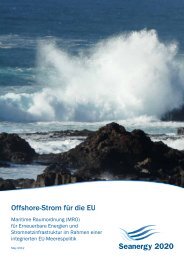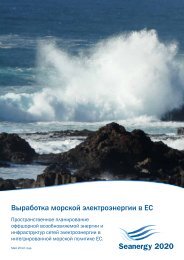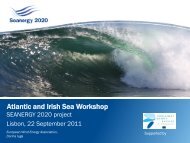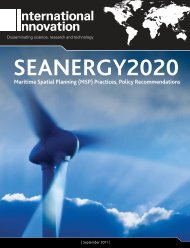Comparative analysis of Maritime Spatial Planning ... - Seanergy 2020
Comparative analysis of Maritime Spatial Planning ... - Seanergy 2020
Comparative analysis of Maritime Spatial Planning ... - Seanergy 2020
You also want an ePaper? Increase the reach of your titles
YUMPU automatically turns print PDFs into web optimized ePapers that Google loves.
a) is legally anchored on renewable energy legislation (such as in Denmark, Germany), this willensure that the sense <strong>of</strong> urgency to develop ORE is the dominant concern and motivationthroughout the licensing process,b) is integrated in a comprehensive MSP legislation (Netherlands),c) is valid indefinitely (United Kingdom),d) gives the permitting and investment responsibility <strong>of</strong> the grid connection to the grid operatorand not to the project developer (Germany, Denmark).4.3 STAKEHOLDER CONSULTATIONAll North Sea countries consult the relevant maritime and non-maritime sectors as well as the publicstakeholders within the ORE consenting process.4.3.1 Good practicesIn Germany stakeholders were involved extensively during the MSP drafting process (2008), so priorto the consenting process for ORE projects, as well as after the exercise (2009) was finalised.4.3.2 Policy recommendations• Consult stakeholders within the licensing processes and <strong>of</strong>fer to institutional as well as noninstitutionalstakeholders the possibility to participate in the preparatory works <strong>of</strong> acomprehensive MSP policy.• Take account <strong>of</strong> relevant comments <strong>of</strong> the different stakeholders to improve the quality <strong>of</strong> theMSP and to anticipate and/or prevent recurrent opposition from certain stakeholders in theconsenting processes <strong>of</strong> ORE projects.4.4 SECTOR CONFLICT MANAGEMENT4.4.1 Barriers and obstaclesIn Belgium, some maritime sectors are subject to regional legislation (e.g. access to ports,maintenance <strong>of</strong> navigation channels, coastal conservation), however, the principal maritime sectorsare governed by federal laws. This may result in the institutionalisation <strong>of</strong> conflicts between sectors.In the UK, as mentioned above, some sectors (defence, aviation) have a veto right in the MSP orlicensing process, which may not always lead to a fair and constructive dialogue between sectors.4.4.2 Good practicesIn 2004, Belgium adopted a zonal delimitation for <strong>of</strong>fshore wind, which was the legal outcome <strong>of</strong> anMSP-like cross sectoral exercise that originated from a sector conflict management. This MSPprocess was driven by the need to manage sector conflicts in a structural way and to put an end toCouncil <strong>of</strong> State appeals blocking the execution <strong>of</strong> permits for <strong>of</strong>fshore wind farms. The zoningdelimitation managed to shift established sand extraction zones to another maritime area in order toDeliverable D 2.382 | P a g e






